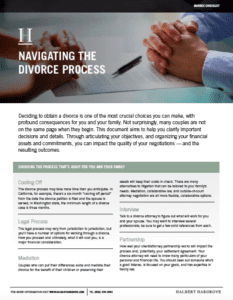The decision to get a divorce is not one to take lightly.
Between getting your financial situation sorted out and figuring out where you’re going to live, the divorce process can be overwhelming.
But you can get through the divorce and money management process with a little guidance and direction.

Keep reading for the steps you need to take to get your divorce and money management situation organized.
Choosing the Right Divorce and Money Management Process
Like every relationship, every divorce process is different. Depending on where you live, you may have a lengthier divorce process than people in other states.
Some states have a “cooling off” period. If you live in California, you’ll have to wait six months to go through your divorce process.
In Washington state, on the other hand, the waiting period is only three months.
As with the cooling-off period, the legal process varies from state to state. If you’re going to hire an attorney to help you with your divorce and money management situation, you’ll want to spend adequate time interviewing potential divorce attorneys.
Another potential option for couples that are able to work together is mediation. This can save significant time and money when it comes to your divorce money settlement.
Understanding Your Divorce and Money Management Situation
The divorce process takes time, and a tedious aspect of it is the analysis of you and your spouse’s financial history and profile.
1. Assets and Liabilities
Not only will you need to account for any tangible or real property assets – think real estate, vehicles that are paid for, and valuable items – but you’ll also need to account for your liquid assets, like checking accounts, retirement accounts, and investment accounts.
Liabilities will be split as well, depending on the type and who is going to keep any assets after the divorce. Real estate debt will go to the person keeping the property, where student loan debt will remain with the borrower.
2. Income and Expenses
As part of the divorce and money management process, you’ll need to provide a full account of your income. That includes income from your employment sources, income from real estate or investment property, as well as retirement income.
While your expenses may not play as significant a role as the other financial pieces in your divorce process, you’ll want to make sure you have a firm grasp on the expenses you’ll incur.
You’re only going to have one income after the divorce.
Other Divorce and Money Management Scenarios to Consider
Figuring out who is going to keep which vehicle and who is going to take on the payments for the appliances is one thing, but there are some other situations to consider that may take a little more time to unwind.
-
- Businesses: If you and your spouse started or operated a business during your marriage, you’ll need to spend time figuring out who is staying with the company.
- Children: For couples that have children, it’s critical to decide who is going to pay for expenses like health insurance and school or college.
- House: While the person who stays in the home will take on the debt of the home, one party will likely buy out the other party.
Each of these situations presents a unique decision for any couple.
You don’t have to go through this process alone, though.
Need help figuring out your divorce and money management process?
buy bactrim online psychotherapy.com/wordpress/img/jpg/bactrim.html no prescription pharmacy
Download our free Divorce Checklist to get you started down the right path.

